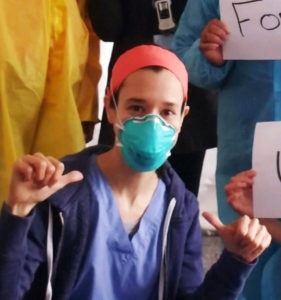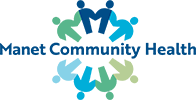
Karla Talledo, MD
As a board-certified internal medicine physician who is also board-certified and fellowship-trained in infectious diseases, Karla Talledo, MD, is front-and-center in Manet’s response to the COVID-19 pandemic. Working together with Chief Medical Officer Lily Yung, MD, and Justin Yang, MD, Director of Occupational Medicine and Manet Administration, Dr. Talledo has helped to shape the health center’s policies and procedures aimed at keeping patients, staff and the community safe during the pandemic. She took a few moments to share some of her insights about the pandemic and why she does what she does.
What made you want to become doctor and why did you choose to specialize in Infectious Disease Medicine in addition to primary care?
I can tell you exactly when I wanted to become a doctor. I was eleven years old and something happened in my life at that time that made me realize that my goal was to help people in a way that would decrease suffering in people.
I was born and raised in Peru, in South America, and one of the leading causes of death in my country was infectious disease, so that was always on my mind when I started studying medicine. And then when I was in medical school and I started doing microbiology, I loved it! I just loved the bacteria, the viruses, the parasites, and in my country when we go to medical school, we are exposed to so many different infections, because infectious diseases are so prevalent there. So, it was very interesting, and I think I decided on infectious disease in my first year of medical school. I came to the United States in 2009 to do my residency and my fellowship.
Why have you chosen to practice at a community health center?
Working at a community health center is a great fit because of where I grew up and my background. I feel strongly that we need to help the people who need it the most. Community health centers welcome a wide variety of people and as an infectious disease doctor at a community health center, I can help stop the spread of diseases that are more common.
What have you learned during the COVID-19 pandemic?
We had an idea that there was the potential for an outbreak to occur – we saw Ebola, we saw SARS, we’ve seen other viruses — but I don’t think anybody was ready for COVID-19. I think we’ve learned how vulnerable we are, but also how we we can be if we come together. We are doing a great job at Manet; we we’ve been hands on from the beginning when we first saw the numbers going up. The pandemic has been a teaching moment for us, and I think we are all embracing learning as much as we can to provide the best care for our patients.
How do you think this will change our practices?
I think our practice has already changed the way we provide care. It may be a few months before we have more answers and it will take more knowledge of the virus and its spread through the community to figure out when we can go back to our normal ways.
What I’ve experienced at Manet with this pandemic, is that we are a strong team. We support each other and I think it’s a great environment to practice medicine in. So that’s why I say we are a strong team. We are hands on and we’re helping everyone. I am glad that I am working with Manet today.
Most important message for patients?
One of the most important things for people to know is that that they play an important role in this pandemic and if they continue playing their role – meaning social distancing, staying home, following CDC recommendations – then this pandemic may end more quickly. Everyone plays a role, not only the doctors, and it is important for everybody to learn and get information from a reliable source, like the CDC, scientists and doctors.
